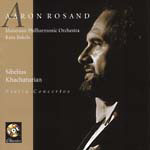Aaron Rosand eschews the usual violinistic fireworks in favor of a more poetic and contemplative rendition of the Sibelius warhorse. Everything is in proportion, yet the want of intensity is undeniable: the great octave leap at the start of the first movement development, for example, impresses rather than stuns (as it does with Viktoria Mullova). The approach works predictably well in the slow movement but proves distinctly underwhelming in the finale. Contrast this with Cho-Liang Lin’s Sony recording, one of the best of the modern versions, which balances bravura with intelligence and insight.
The Khachaturian can take Rosand’s close-to-the-vest approach even less well, as it is a less substantial work structurally and relies on a red-hot evocation of its beguiling tunes. David Oistrakh provided this in spades on his classic recording, employing a bigger and beefier tone than Rosand musters. However, Kees Bakels is up to the task of presenting Khachaturian’s orchestral accompaniment in all its decadent splendor (he’s not bad in the Sibelius either). The rather resonant recording manages to keep the violin believably in the acoustic mix with the orchestra, though an over-emphasis on bass frequencies is apparent in the Khachaturian.
































